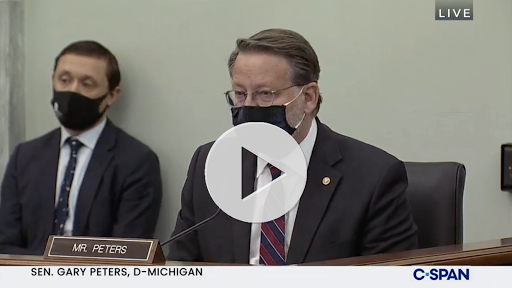Peters Discusses Michigan Priorities with Secretary of Commerce-Designate Raimondo, Urges Quick Confirmation
Peters Secures Commitment from Raimondo to Work Together on Strengthening Federal Manufacturing Policy, Self-Initiating Trade Investigations Against Unfair Trade Practices
WASHINGTON, DC – U.S. Senator Gary Peters (MI), a member of the Senate Commerce, Science and Transportation Committee, today called for swift confirmation for President Biden’s Secretary of Commerce-designate Gina Raimondo. During Raimondo’s confirmation hearing today, Peters secured commitments to work together on a number of key priorities, including a need for a comprehensive manufacturing strategy and federal policy and ensuring a fair playing field for workers like those in Michigan’s cherry industry who have been hurt by unfair trade practices. Peters previously met with Raimondo shortly after she was nominated to lead the Department of Commerce.
“We’re in an unprecedented economic crisis due to the pandemic. We need strong leadership at the Commerce Department to jumpstart our economy, create jobs and build back better,” said Senator Peters. “In my conversations with Secretary-designate Raimondo — and at today’s hearing — she has demonstrated a commitment to strengthening our manufacturing sector and standing up for American workers. I urge my colleagues to quickly confirm her nomination through the Senate, and I look forward to working with her and the Biden Administration to advance a number of issues important to Michigan.”

Peters discusses Michigan priorities with Secretary of Commerce-designate Gina Raimondo. You can watch the video by clicking here.
Peters previously introduced the National Institute of Manufacturing Act that would establish an independent federal institute to serve as the hub for federal manufacturing programs that would be led by a Chief Manufacturing Officer (CMO) responsible for creating and implementing a National Strategic Plan for Manufacturing across the executive branch. The National Institute of Manufacturing Act would coordinate federal manufacturing programs across multiple agencies in order to better address both short-term supply chain issues caused by the Coronavirus pandemic and longer-term problems related to a lack of a national manufacturing strategy and accountability for implementing a strategy. The legislation was supported by a number of organizations, including Motor & Equipment Manufacturers Association, the Alliance for American Manufacturing, the Association of Equipment Manufacturers, the Michigan Manufacturing and Technology Center (MMTC) and the American Foundry Society.
Peters has fought tirelessly for Michigan’s cherry growers. He has met with Michigan cherry growers and has heard firsthand about how illegal dumping and unfair trade practices from countries like Turkey have devastated their businesses. Peters introduced bipartisan legislation that would create a task force within the Department of Commerce to investigate potential trade abuses for small and medium-sized industries. Under current law, the Commerce Department has the authority to self-initiate investigations into dumping and subsidies, but rarely utilizes this authority. The majority of their investigations begin only after companies or industry representatives lodge formal complaints. Small and medium-sized businesses, including agricultural producers, manufacturers, parts suppliers, and paper goods producers, often lack the resources needed to identify unfair practices and bring them to the attention of the Commerce Department. Peters’ legislation would better ensure the Commerce Department has the resources needed to support American businesses looking to expand both here at home and throughout the international marketplace.
###